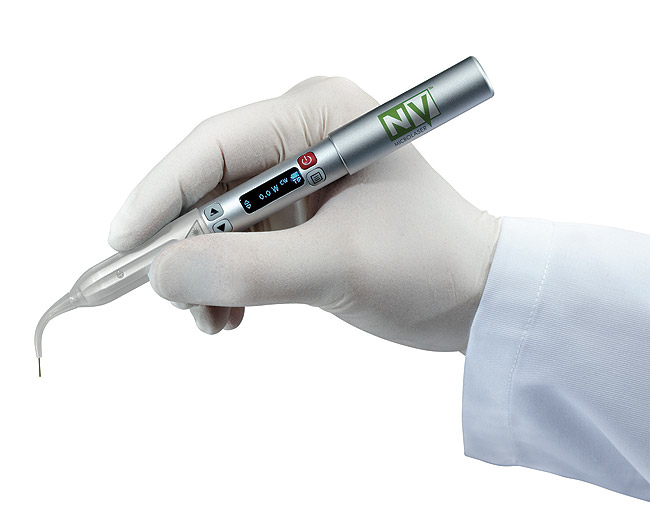Discus Dental Has Expertise, Tools to Meet Dentists’ Laser Needs
Much has changed in recent years regarding dental lasers, says Michael Miyasaki, DDS, Vice President of Professional Relations and Advanced Education at Discus Dental. Not the least of these changes are price, size, and convenience—while costs and sizes of lasers have come down, user convenience has increased.
“I’ve had the opportunity to work with lasers for the past 15 years, and they have gone from weighing around 45 pounds down to just 1.9 ounces,” Miyasaki says. “Today they are much more portable and user-friendly. Now we’ve got pre-cleaved disposable tips that virtually eliminate set-up time, making laser usage very convenient. Back then we had to wheel the laser in on a cart. Today, because they are so lightweight and wireless, lasers can basically be carried around in your pocket.”
According to Miyasaki, laser prices “have fallen precipitously,” which has helped pique the interest of dentists. “Lasers are finally priced almost on par with other radiosurgery units that are available today,” he says. “I think doctors are comparing an electrosurgery unit to lasers and figuring, why not just use a laser—which is more precise and easier to use.”
Miyasaki believes that as more doctors and hygienists begin to use lasers, there will be a greater acceptance of their use. “Ten years ago, lasers were viewed as more of a luxury piece of equipment, whereas today doctors are looking at them more as a need. I see lasers as a way to generate revenue and improve the quality of care that we render to our patients.”
Compared with conventional procedural methods and surgical devices such as electrocautery, a laser is gentler and more predictable, and usually requires little to no local anesthetic, according to Miyasaki. Diode lasers cut with a very small zone of necrosis, enabling clinicians to perform a variety of soft-tissue procedures without having to worry about gingival recession. They can also be safely used around implants. Patients experience minimal, if any, discomfort, healing occurs more quickly, and immediate hemostasis can be achieved.
Another important advantage of lasers, Miyasaki suggests, is how patients perceive the technology’s minimally invasive nature. “If I need to use a scalpel to do a small gingival procedure, the patient might decide he could live with his small imperfection as is. But if I tell the patient I’m going to use a laser and vaporize the tissue, that he isn’t going to really feel anything or have any bleeding afterwards and there won’t be any postoperative discomfort, he’ll be more inclined to go ahead with the procedure.”
Miyasaki also believes patients view doctors who use lasers in a positive light. “I think when doctors pull out a laser, their patients consider them a high-tech dentist who is providing the very best care. Lasers are a practice differentiator.”
Discus Dental offers several soft-tissue diode laser products, including the SL3™, a new portable desktop unit launched earlier this year. Weighing just 1.85 pounds, the SL3 features long-lasting battery operation, a wireless foot pedal that provides convenient laser activation, and disposable fiber tips that eliminate the need to strip and score fiber before each use.
The company’s NV Mircolaser™ and NV Ortho™ are pen-sized (6.3” L x 0.65” diameter) soft-tissue lasers that weigh just 1.9 ounces while offering the power and capabilities of larger desktop models. The fully self-contained, wireless lasers provide optimal mobility while delivering 2 watts of output power.
Discus Dental emphasizes the importance of training and offers both introductory courses for potential laser customers and full certification courses, which are free with the purchase of a Discus laser. “We provide a good introduction to lasers and give clinicians some hands-on experience, as well,” he says. “These programs help equip the doctors with the knowledge they need to make an informed decision about which laser best fits into their practice.”
Once customers purchase a Discus laser, they receive a free 8-hour online certification course through the company’s training partner, Advanced Laser Training, Inc. (ALT), and have the opportunity to attend a live course taught by ALT. The online 8-CE credit laser certification course is conveniently split into multiple video segments and can be taken at the customer’s own pace. “Training ensures the best results for patients, and that’s why Discus has included the training in the purchase price. The company feels it has a responsibility to both the doctors and the patients,” Miyasaki explains.
Another benefit to Discus laser customers is if they determine the laser isn’t right for their practice they can return the unit within 30 days from purchase and receive a full refund. Miyasaki says the company can make such an offer because with the quality of its lasers and the ample support available, “there’s rarely ever a need for a return.”
Miyasaki foresees dental lasers becoming even more multifunctional and their usage increasing. “Some units are modular, so doctors can buy the type of laser wavelength they want and pop it in the unit. Rather than having two or three different lasers they can have one laser with the various wavelengths used in the one unit,” he says.
While Miyasaki doesn’t quite envision lasers completely replacing the handpiece or scalpel, he believes they will continue to increasingly become part of the mainstream dental industry. “I think we’ll find more and more uses for them. I think every dentist is going to probably end up with a laser at some point,” he predicts.
Discus Dental, LLC
8550 Higuera Street, Culver City, CA 90232
800-422-9448
www.discusdental.com
info@discusdental.com




